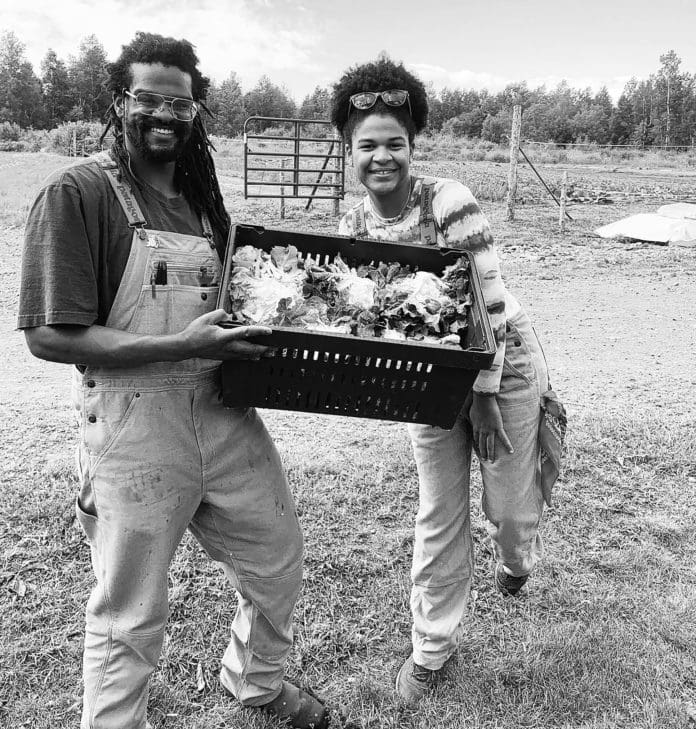The University of Minnesota Farm Family Recognition Program honors Minnesota farm families for their significant contributions to both the agricultural industry and to their local communities. Begun in 1979, the program is coordinated by University of Minnesota Extension; the College of Food, Agricultural, and Natural Resource Sciences; and the College of Veterinary Medicine.
Lake County’s 2023 Farm Family of the Year is Wolf Ridge Farm, managed by Sarah Mayer. “What we eat affects not only our own health, but also the health of all life on Earth,” Mayer says. “It’s our responsibility to acknowledge that, and take steps necessary to promote and maintain universal health.”
Wolf Ridge Farm provides agricultural and stewardship based service learning experiences for kids and adults; educational classes to school groups; outreach to farmers’ market attendees; mentorship for naturalists; tours for the public; internships for university students; and an “intensive farming experience” through World Wide Opportunities on Organic Farms (WWOOF) for those who may wish to pursue a career in food and farming.
During the months of September through May, or as a summer camp experience in July and August, school groups, typically 4th through 12th graders, visit Wolf Ridge Environmental Learning Center. Most students are on-site for three to five days, and one of the classes offered takes place at Wolf Ridge Farm. A 40-minute hike takes students from Wolf Ridge’s main campus to a “lush and delicious farmscape”, where they become vegetable farmers for an hour or two and learn “what it takes to support a healthy food ecosystem.” Mayer notes that, “since the farm’s establishment in 2013, the Food and Farming curriculum and week-long farm camp have been gaining popularity with school districts and summer campers.”
Sarah Mayer said, “Wolf Ridge Farm provides a production-based classroom in which students harness Mother Nature’s gifts to nourish themselves and others. Students have the opportunity to observe healthy ecosystems, lay a foundation to think critically, and ask questions about why eating locally and eating whole foods might benefit people, and the planet. Fostering earth care through exploration and task-based learning will propagate mindful stewards who are in turn nourished by the resources that they nurture.
“Kids feeding kids is a super powerful act. It gives them a sense of belonging and autonomy and peer connectedness. The sense of pride is overwhelmingly evident when a group of students harvests, washes, and serves vegetables to the entire Wolf Ridge Community. Ultimately, these kids are able to begin a healthy relationship with what nourishes them.”
Wolf Ridge Farm grows over 10,000 pounds of vegetables that are used to feed not only students in Wolf Ridge’s dining hall, but also regional food shelves, schools, and the Finland community. Relationships built among food shelf directors, school agriculture teachers, community members, and Wolf Ridge Farm are a solid foundation on which to “fill food accessibility gaps in our food system in northeast Minnesota.”
“With a dual focus on education and production, the Wolf Ridge Farm continues to build capacity to support farmer training methods that will retain farmers in the Northeast region of Minnesota. To build a sustainable food system, we are working on fulfilling the need for more producers by designing and piloting a paid, regenerative vegetable farming apprenticeship in 2023 and 2024, respectively,” Mayer adds.
This season, Wolf Ridge Farm was selected to host two farmers through WWOOF-USA’s Future Farmer Program. The program, established in 2021, awards 20 grants annually to individuals committed to becoming farmers, and is designed to help fund a one-month farm visit. Rosa Soriano, originally from the Dominican Republic and now enrolled in a Masters program at New Mexico Highlands University, and Michael Miller, chef and “foodie” from Birmingham, Alabama, were Wolf Ridge’s Future Farmers this year. “Inspiration has been spread far and wide during their time in Finland and along the North Shore,” Mayer says. “We have all learned so much about healthy food systems, farming, culture, and our relationships with one another in such a short time. I have no doubt we’ll cross one another’s paths again soon.”
Success stories from Wolf Ridge Farm include that of Federica Ranelli, Wolf Ridge’s 2019 Field Manager. Ranelli is now the Farm Manager at Troy Farm, a vegetable production and education project of the non-profit Rooted, in Madison, Wisconsin. 2022’s Field Manager, James House, went on to join the farm crew at Esalen Institute, a learning and retreat center in Big Sur, California. This position enables House to work close to his home and family.
If you’d like to see what Wolf Ridge Farm has growing, or lend a hand, contact Sarah Mayer at sarah.mayer@wolf-ridge.org.



